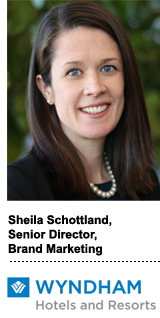
Travel is a personal experience, and travel marketing should be too, according to Sheila Schottland, senior director of brand marketing at Wyndham Hotels & Resorts.
“People travel for different reasons – family, business, leisure – and they have different needs,” she said. “Because these moments are relatable, we make sure that our media mix follows suit, that the creative and the media tie together.”
Last year, Wyndham Hotels & Resorts completed a spinoff from Wyndham Destinations, and became an independent parent company to 20 economy hotel brands, including Travelodge, Super 8, Ramada, Howard Johnson and Days Inn, most of which have fairly good name recognition on their own.
But people don’t necessarily know that these brands now all sit under the Wyndham umbrella. And that was the motivating factor behind a new portfolio brand marketing campaign, which launched in late April and goes through the summer, to drive awareness of the “by Wyndham” banner along with trials and loyalty membership.
The campaign is running across streaming channels, such as Hulu, video on demand, radio (both streaming and terrestrial), mobile, digital, social media and good-old linear TV, including live sports, morning news and primetime network programming, like Food Network, HGTV, TBS, Travel Channel, Comedy Central and ESPN.
AdExchanger spoke with Schottland about the value of radio, why linear TV is “alive and well” and Wyndham’s plan not to in house its programmatic buying, at least for now.
AdExchanger: How would you describe Wyndham’s digital marketing philosophy?
SHEILA SCHOTTLAND: Our digital mindset is about being really integrated. Every year we get more integrated. It’s what we’re continuing to evolve toward. A digital experience also gives us the chance to really personalize our messages.
Why does video play such a prominent role in your media mix?
We’re gearing our media to where the behavior is, and video always performs very well for us, because it allows us to tell our story.
We’re investing in streaming and online video to capture that audience of cord cutters and cord nevers, and we’re investing in smart TVs and thinking about how we can use them in our advertising, especially for retargeting.
What about linear TV?
For us, linear TV is alive and well and great for awareness. Most of the engagement we see among our target audience, and this is no surprise, happens around live programming, like sports and events, and so we plan heavily against both.
But we’re also investing in radio, especially traffic and weather, in the car. We see a lot of roadside travel business from people who are driving and pull over to book a hotel on the same day. We’re always looking for more sophisticated data about what people are searching for.
Wyndham has a lot of different brands. What’s your data strategy?
We rely on our own segmentation research. We have first-party data, of course, as well as second- and third-party data, and we work with media partners that allow us to target people that exhibit travel behavior. It’s extremely valuable for us to know, for example, that someone is reading articles about travel and that they’re interested in one of our brands or a competitor’s brand.
What sort of data do you get from partners?
Booking trend history, what people are searching for, their location and the reason for their travel. We can join that with our own segmentation data to understand more about the type of people who stay with us and to create look-alike audiences.
We’re also trying to be more contextual and do more custom work.
In what way?
One example is how we’re working with Foursquare. The message that we’ve created for our current campaign is that no matter where you are, you’re probably only about 10 minutes away from a hotel by Wyndham. So, location-based messaging is a great way to connect with people searching for hotels on Foursquare. We have a rich media unit with a drop down that lets you click on the ad to see all of the hotels within 10 minutes of a location.
How are you approaching programmatic?
We work with our media agencies on programmatic, but it’s hugely important to us. When it comes to our direct response efforts, everything we do is programmatic. It goes back to the personalization of travel and trying to reach someone based on the occasion and the need.
We’re going after a person, not necessarily just a publication, and that allows us to retarget people who come to our site or who care about a specific brand, like Ramada, or who are also a rewards member. We can serve up an offer depending on your engagement. Programmatic gives us flexibility and the ability to be efficient with our media dollars.
Why not bring that function in house?
We have no plans to do anything differently right now, but we’re always looking at what will be the most efficient thing and so, going forward, anything could change.
This interview has been edited and condensed.
This post was syndicated from Ad Exchanger.


More Stories
NBCUniversal and Jeep Rev Up a Partnership For The Real Housewives of Beverly Hills Reunion
Peter Thiel-backed AI Startup Sentient Pitches Itself More Transparent than OpenAI and Perplexity
Mark Read’s Pay Hit, DEI Silence, and Other Key Takeaways from WPP’s Annual Report